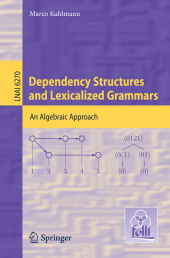 Neuerscheinungen 2010Stand: 2020-01-07 |
Schnellsuche
ISBN/Stichwort/Autor
|
Herderstraße 10
10625 Berlin
Tel.: 030 315 714 16
Fax 030 315 714 14
info@buchspektrum.de |

Marco Kuhlmann
Dependency Structures and Lexicalized Grammars
An Algebraic Approach
Herausgegeben von Kuhlmann, Marco
2010. xii, 137 S. 48 SW-Abb. 235 x 155 mm
Verlag/Jahr: SPRINGER, BERLIN 2010
ISBN: 3-642-14567-1 (3642145671)
Neue ISBN: 978-3-642-14567-4 (9783642145674)
Preis und Lieferzeit: Bitte klicken
This book develops a formal theory of dependency structures and shows how combining them with a regular means of composition yields copious hierarchies of ever more powerful dependency languages. It also classifies several relevant grammatical formalisms.
Since 2002, FoLLI has awarded an annual prize for outstanding dissertations in the fields of Logic, Language and Information. This book is based on the PhD thesis of Marco Kuhlmann, joint winner of the E.W. Beth dissertation award in 2008.
Kuhlmann´s thesis lays new theoretical foundations for the study of non-projective dependency grammars. These grammars are becoming increasingly important for approaches to statistical parsing in computational linguistics that deal with free word order and long-distance dependencies. The author provides new formal tools to define and understand dependency grammars, presents two new dependency language hierarchies with polynomial parsing algorithms, establishes the practical significance of these hierarchies through corpus studies, and links his work to the phrase-structure grammar tradition through an equivalence result with tree-adjoining grammars. The work bridges the gaps between linguistics and theoretical computer science, between theoretical and empirical approaches in computational linguistics, and between previously disconnected strands of formal language research.
Preliminaries.- Projective Dependency Structures.- Dependency Structures of Bounded Degree.- Dependency Structures without Crossings.- Structures and Grammars.- Regular Dependency Languages.- Generative Capacity and Parsing Complexity.- Conclusion.


